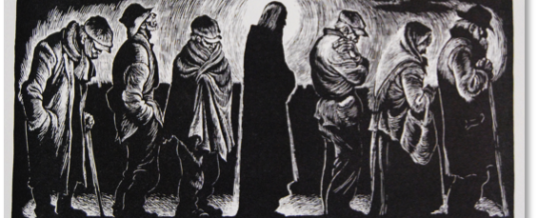
Christ the King Sunday, and Matthew provides us a description of king: one who looks after ‘the least of these brothers and sisters’ when they are hungry, thirsty, naked, sick, imprisoned, strangers. Or one who may himself be experiencing some of that. Hard for us to reconcile our image of kingship with the image Matthew offers … no signs of palaces, crowns, riches in these images.
Through Baptism, we become part of the Body of Christ, “anointed priest, prophet and king” (Rite of Baptism #63). A king is not someone who earns this position or wins it during a political election; a king inherits the crown, and is called to govern well and live and act in ways that ensure dignity of life for all. This, in fact, is an abiding theme of Catholic Social teaching: choose that which is life giving for everyone – yourself and others. As exhibited throughout all his ministry, here again Jesus challenges us to ensure that all peoples, ‘all nations’ have all they need to live with dignity … and he tells us we will be judged on how we contributed to that … or failed to. Placed as it is just before the last supper and the events which followed it, we know this is a significant message, one which demands our attention.
On October 3rd of this year, Francis released his encyclical Fratelli Tutti in which he reminds us that “the words of Jesus [as proclaimed in this gospel reading] … compel us to recognize Christ himself in each of our abandoned or excluded brothers and sisters.” (FT#85)
Francis notes that the body of Christ is one without borders. He stresses the importance of dialoguing with people with whom we disagree. This is a challenge in today’s world, which rather than encouraging dialogue among people of opposing viewpoints, has instead grown in its contempt for those with whom we disagree. Dialogue involves listening. For me, that would mean dialoguing with someone like Donald Trump, for instance. Beyond difficult to well nigh impossible, as I can’t even listen to him speak from my television screen, and yet for a body of Christ without borders, I must remember that President Trump is also part of that body and as such deserves my respect.
Jesuit priest John Kavanaugh has written: “Before our own times, entire tribes of indigenous peoples disappeared in North and South America, sacrificed to the idols of gold. Jews were banished or forcibly converted long before the abominable ‘final solution.’ Holy ‘religious’ wars were launched in the name of God. Children of every colour and tribe have been traded or killed upon birth. To such a bleak history, the Lord of history has spoken: ‘As often as you have done this to the least of my brothers and sisters, you have done it to me.’” God has spoken, but have we heard? Are we even able to hear?
Interestingly in the Gospel, those who will ‘inherit the kingdom’ don’t recognize what they have done to merit it. They see nothing exceptional in what they do – it is simply who they are: they see hunger and they feed, thirst and they water, naked and they clothe, sick and imprisoned and they visit, stranger and they welcome. We all know people like that; and sad to say we know those who are not like it. Maybe there are times when we ourselves can fit into either category. The responsibility of being a king seems a huge one – it is not likely one we would willingly seek out. However, it is one we have inherited. In Fratelli Tutti, Francis says there are only two kinds of people in the world today: those who help, and those who turn away. Which kind are we?
Ellen Bennett, Archdiocese of Moncton
NOV
2020

About the Author: